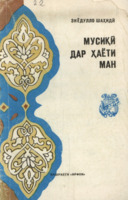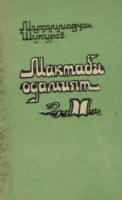Browse Documents (2 total)
Мусиқӣ дар ҳаёти ман Music in my life
From the publisher: Китоби «Мусиқӣ дар ҳаёти ман» доир ба мафҳуми мусиқӣ, таъсиру хосиятҳои он, роҷеъ ба фаъолияти бастакорони тоҷик ва марҳилаҳои инкишофи он маълумот медиҳад.
Ziyodullo Shahidi (1914-1985) was a Tajik musician, conductor, and composer. Originally trained in the Maqom tradition, Shahidi was recruited to the Moscow conservatory, where he studied with Aleksandr Lensky, Vladimir Fere, and Sergey Balasanyan - all of whom were involved in the project of "modernizing" indigenous musical traditions across the USSR. The volume collects Shahidi's essays on the music of other composers, as well as accounts of his initial recruitment, studies, work with the poet A. Dehoti, and other episodes from his career.
Ziyodullo Shahidi (1914-1985) was a Tajik musician, conductor, and composer. Originally trained in the Maqom tradition, Shahidi was recruited to the Moscow conservatory, where he studied with Aleksandr Lensky, Vladimir Fere, and Sergey Balasanyan - all of whom were involved in the project of "modernizing" indigenous musical traditions across the USSR. The volume collects Shahidi's essays on the music of other composers, as well as accounts of his initial recruitment, studies, work with the poet A. Dehoti, and other episodes from his career.
Мактаби одамият: Баъзе масъалаҳои адабиёт
ва маънавият.
The School of humaneness: some questions of literature and spirituality
Muhammadjon Shakuri (Shakurov) (1924-2012) was a Tajik philologist and academician. He studied at the pedagogical institute in Dushanbe and later earned his kandidatskaia and doktorskaia degrees at the Institute of World Literature in Moscow. His professional home, however, remained the Rudaki Institute of Language and Literature in Dushanbe. In the late 1980s he became a leading figure in the campaign for the primacy of the Tajik language. This volume collects a number of his articles on the relationship between literature, spirituality, and morality. It also includes several pieces recounting experiences with Sadriddin Ayni, Mirzo Tursonzoda, A. Dehoti, and Mirsaid Mirshakar.

